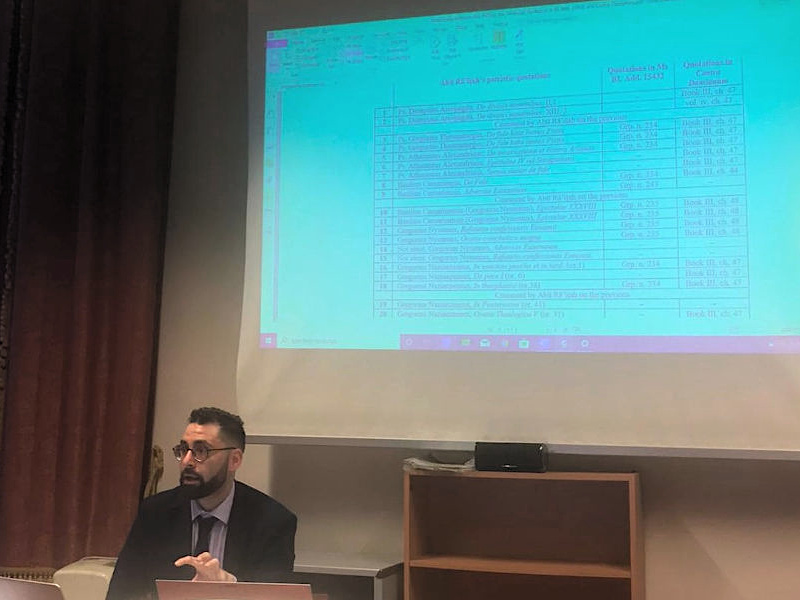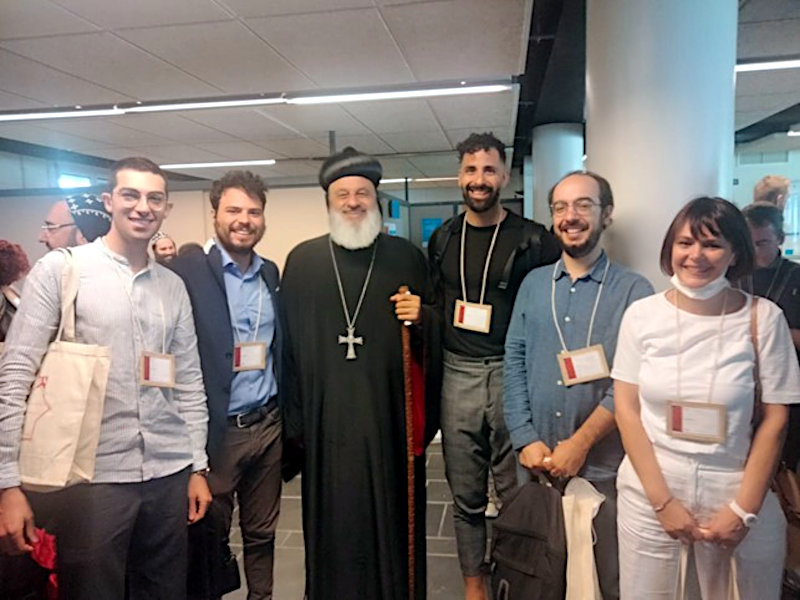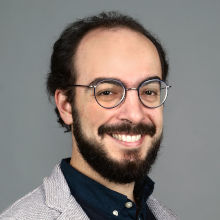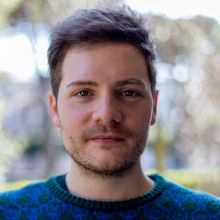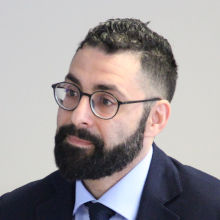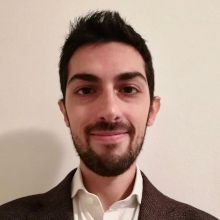Group
Principal investigator
Emiliano Fiori is Associate Professor at Ca’ Foscari University of Venice and FLOS’ Principal Investigator. He published extensively on phenomena of transfer of philosophical and theological knowledge from Greek to Syriac. Among his main publications: a critical edition with Italian translation of Sergius of Resh‘ayna’s version (6th century) of Dionysius’ the Areopagite’s core writings: "Dionigi Areopagita. Nomi divini, Teologia Mistica, Epistole. La versione siriaca di Sergio di Resh‘ayna (VI secolo)", 2 vols., Louvain: Peeters, 2014; and an edited collection of contributions on philosophy in Syriac ("La philosophie en syriaque", Paris: Geuthner, 2019, with Henri Hugonnard-Roche). In 2011 he was awarded the John Templeton Award for Theological Promise.
Other team members
Andrea Bellettato is a PhD candidate and a member of the FLOS’ team. His research focusses on the reception of Greek patristic sources in some 8th-9th century Eastern Syriac authors, and on the use they made of florilegia. Andrea graduated from the University of Oxford in 2014 (BA in Classics), and then went on to study at the University of Padua. He completed his MA in 2018 with a dissertation on Tatian and Bardaisan, which was awarded both the “Anna De Sio” prize and the “Sacerdote Emilio Gandolfo” scholarship for best thesis on a religio-historical topic.
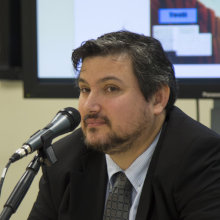
Federico Boschetti is PhD in Classical Philology (University of Trento - University of Lille III, 2005) and in Cognitive and Brain Sciences: Language, Interaction, and Computation (University of Trento, 2010). Since 2011, he has been a researcher at the Institute for Computational Linguistics "A. Zampolli"(CNR-ILC). He currently works at the CNR-ILC detached research unit located at the Centre for Digital and Public Humanities (VeDPH) of Ca' Foscari University of Venice. His research interests are: Digital Philology, Historical OCR, Handwritten Text Recognition, and Distributional Semantics applied to ancient texts.
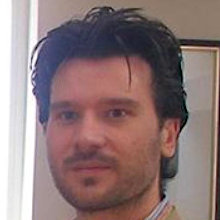
Angelo Mario Del Grosso is a computer engineer. He got his PhD in Information Engineering on designing software components for textual scholarship. He has been working at the Institute for Computational Linguistics “A. Zampolli” in Pisa since 2010 and he got a fixed position as a researcher in 2019. His main research activities involve text representation, text processing and text exploitation of philological resources. His research interests aim to formally model the structure of the text, including documents, writers, readers, historical transmission process, etc. This computational framework tries to combine both scientific and historical views of the textual resources. He is one of the members of the steering board of the Italian Association of Humanities Computing (AIUCD). He participates in various national and international research projects dealing with digital humanities research like PRIN and ERC projects. He teaches text encoding at the University of Pisa as an external lecturer.
Bishara Ebeid specialized in Byzantine, Coptic, Syriac and Christian Arabic Theology at the Pontifical Oriental Institute in Rome, where he got his MA in 2012 and his first doctoral degree in 2014. His dissertation on the Christology of Christian Arabic authors was published as "La tunica di Al-Masīḥ. La Cristologia della grandi confessioni cristiane dell’Oriente nel X e XI secolo" (Roma: Edizioni Christiana Orientalia, 2018). This monograph was followed by an edition and study on Elias of Nisibis, "Elias of Nisibis. Commentary on the Creed (Tafsīr al-amānah al-kabīrah)", CNERU-CEDRAC, Beyrouth. In 2019 he obtained his second doctoral degree from the Aristotle University of Thessaloniki, with a dissertation on the figure of Pontius Pilate in the New Testament and in apocryphal literature. Since February 2019 he has been working works as an Assistant Professor at Ca’ Foscari University of Venice.
Claudia Simonelli completed her master’s degree in “Oriental Languages” at Ca’ Foscari University, specializing in Arabic and Syriac philology. She is Research Fellow in Ancient Christian Literature at the Department of Asian and North African Studies. Her research interests actually lie in the area of Digital Humanities, with a focus in scholarly digital editing, digital codicology and paleography. Within FLOS she has conceived the encoding model for the digital critical edition, and provided the physical descriptions of manuscripts and information on the collection history as a whole. She is now working on the collation of manuscripts containing the patristic florilegia.

Luigi Tessarolo, independent scholar, has been ICT Project Manager for many academic projects funded by Italian and European institutions and concerning Latin poetry (Poeti d’italia in lingua latina tra medioevo e rinascimento, 1999 and 2001; Musisque Deoque, 2005 and 2007; Pedecerto, 2011), Spanish literature (Miguel de Cervantes, Novelas ejemplares, 2004; La Pícara Justina, 2015; EPIGRAMA, 2017), 18th-century music dramas (Pietro Metastasio, Drammi per musica, 1998; Carlo Goldoni, Drammi per musica, 2001; Libretti d’opera, 2002; Apostolo Zeno, Drammi per musica, 2018), Franco-Italian literature (RIALFrI, 2012), Ancient Greek epigraphy (AXON, 2015), and the 16th-century European book market (EMoBookTrade, 2020). Luigi provides FLOS with technical-IT support for FLOS and is the author of the website structure for www.florilegiasyriaca.eu.

Guido Venturini earned his PhD in Byzantine and Oriental Philology at Sapienza - University of Rome. In his doctoral thesis he studied the Syriac version of the Life of John the Almsgiver, whose critical text and translation he published in the CSCO series at Peeters. His main research interests lie in the area of textual criticism and history of the tradition of hagiographic and patristic works preserved in Greek and Syriac. In the past Guido also worked in Louvain as a collaborator of the GREgORI project and taught Classical languages at the Catholic University of Buenos Aires. Within the FLOS project, he is currently focusing on the anti-Julianist florilegia preserved in the collections studied by the research group.
Emanuele Zimbardi earned his PhD in Classical and Byzantine Philology at Sapienza - University of Rome and the Freie Universität Berlin. His thesis focused on the critical edition and the linguistic analysis of the Greek translation of the metrical sermon "On Jonah and the Ninevites" attributed to Ephrem the Syrian. His research interests are in the textual transmission of patristic literature in Greek, Syriac and Arabic, the linguistic interaction of Greek and Oriental languages in the Middle Ages, and the spreading of Greek paideia and rhetoric in Syriac literature. Since September 2020, Emanuele has been a research assistant within the project FLOS. His contribution to the project concerns the grammatical analysis of Syriac texts via a semi-automatic software (in cooperation with the project GREgORI based at Louvain) and the edition and commentary of the four unedited sermons "On Providence" by Antony of Tagrit (9th c.).



